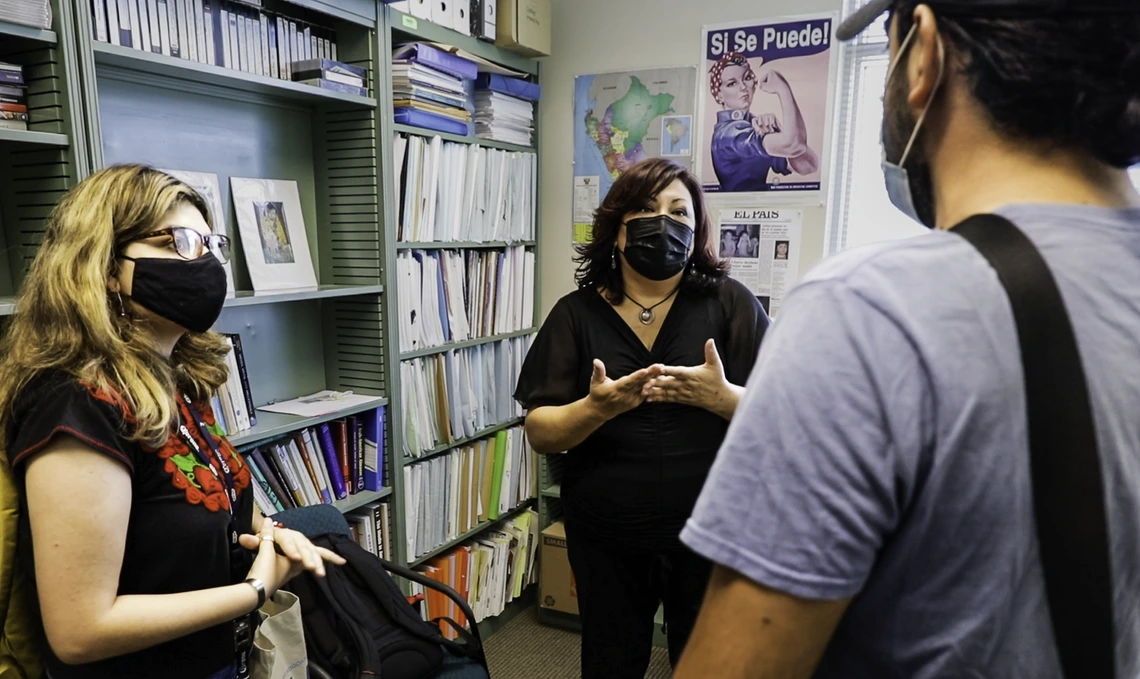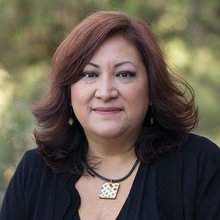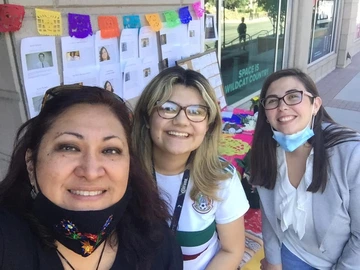Dr. Jessica Retis named new school director

Professor Jessica Retis, who started a Bilingual Journalism master's degree at the School of Journalism, meets with students in her office.
Photo courtesy of College of Social and Behavioral Sciences
Professor Jessica Retis, a globally recognized scholar in Latinx media and bilingual journalism, has been appointed director of the University of Arizona School of Journalism, the College of Social and Behavioral Sciences announced today.
Retis, director of the school’s Bilingual Journalism master’s program, will take over duties from Interim Director Michael McKisson on July 1.

Dr. Jessica Retis
“I want to thank Dr. Retis for her willingness to take on this role,” College of SBS Dean JP Jones said in a statement to faculty and staff. “I'm pleased that the School of Journalism will continue to be in excellent hands moving forward.”
Retis, who was born in Peru, is the first professor of color to be named director in the school’s 72-year history. She’s the 12th person to lead the School of Journalism and the third woman after Jacqueline Sharkey and Carol Schwalbe.
“In a few years, we will be celebrating our 75th anniversary, and I believe we have an excellent opportunity to work on achieving this milestone with a solid and integrated school,” Retis said.
Retis holds an undergraduate degree in Communications from the University of Lima, Peru, a master's in Latin American Studies from the National Autonomous University of Mexico and a Ph.D. in Contemporary Latin America from the Complutense University of Madrid.
“Dr. Retis is a visionary who has extensive professional journalism, research and teaching experience in countries around the world," Professor Jeannine Relly said. “She will assume the directorship role at a critical time for the school, which has recently launched three new degree programs (including Studies of Global Media) and a redesign of the Journalism B.A.
“Professor Retis is known for her innovative programming, her strategic perspective and her ability to build bridges in communities. We are very much looking forward to her leadership.”

From left, Dr. Jessica Retis, Ana Teresa Espinoza and Julia Blumberg.
Retis worked for more than two decades as a journalist in Peru, Mexico and Spain in print and broadcast media outlets. She has three decades of teaching experience in various universities in the United States, Spain and Mexico.
“Dr. Retis works tirelessly to help her students and to increase representation of Latinx individuals in academia and newsrooms,” said Julia Blumberg, the first graduate of the dual master’s degree program in Bilingual Journalism and Latin American Studies. Retis advised Blumberg’s recent journalism M.A. project, “Ecologies of Care: How Cross Border Humanitarian Organizations Support Asylum Seekers.”
“(Retis) works around the clock,” Blumberg added, “to make sure everyone has opportunities to find funding for the Bilingual Journalism graduate program, applications for research grants, internship opportunities, and inviting guest speakers to meet with students based on their interests.”
Retis joined the University of Arizona School of Journalism faculty in 2019 and was awarded the Provost Investment Fund (PIF) to launch a new master’s program in Bilingual Journalism. In 2021 she was awarded the title of Center for University Education Scholarship, CUES Distinguished Fellow for her research project “Bilingual Journalism Education in the United States: Development, Implementation and Assessment.”

Dr. Jessica Retis worked as a professional journalist in broadcast and print before entering academia.
Retis holds a dual courtesy appointment with the university’s Latin American Studies department and the Graduate Program in Human Rights Practice. Before joining the University of Arizona, she worked for a decade at California State University Northridge (CSUN).
“I’ve researched news media industries and, more recently, the designing, implementation and assessment of journalism programs and the studies of teaching and learning and bilingual pedagogy,” Retis said. “This acquainted me with the challenges and opportunities of student, faculty and staff recruitment and retention — areas that are crucial for the success of our school.”
Retis has authored or co-authored multiple books and papers, including the recent "Reporting on Latin/a/x Communities: A Guide for Journalists."
She served as co-chair of the Diaspora and the Media Working Group for the International Association of Mass Communication Research (IAMCR), co-chair of the Latina/o Studies Section of the Latin American Studies Association (LASA). She is also the vice president of the Binational Association for Schools of Communication (BINACOM). She was elected academic at-large officer of the National Association of Hispanic Journalists and advises the NAHJ Student Chapter at the UA School of Journalism.
“I know I can go to Dr. Retis for anything, be it guidance with teaching, life advice, or support for growth in my studies,” Blumberg said. “She always pushes me to be better and to reach my full potential. I am super thankful for her support as a mentor and her continued interest in not only my professional advancement, but also how I am doing mentally.
“Words cannot describe enough what her support has meant to me during my time as a graduate student. I do not know anyone more deserving to be the new director of the School of Journalism.”

Prof. Michael McKisson
McKisson, an associate professor of practice, led the school for a year as it returned to in-person classes following the pandemic and the university's mask mandate. He helped get a new, more flexible curriculum approved for fall 2022 and worked with a donor and the college on a new broadcast/podcast studio that is expected to start construction this summer. He also oversaw the hiring of new instructors and the return of two in-person events: the Zenger Award for Press Freedom and the school's second Hall of Fame.
“My thanks to Mike McKisson for his excellent leadership as interim director this last year," Jones told faculty and staff.
Kim Newton, a professor of practice, said one of the most difficult issues for an interim director is "managing different personalities" of faculty, staff and administrators on campus.
“Through it all, Mike always maintained a positive and upbeat attitude,” Newton said. “He’s cool under pressure, always has the best interests of students, faculty and staff, and cares deeply about the school. He has shown grace under pressure and kept moving us all in a positive position.”

